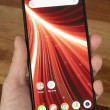5G NR
(5G)
5th Generation New Radio
The global standard for cellular network technology designed to eventually replace 4G LTE technology. The first version of the 5G NR standard was finalized by the 3GPP industry group in late 2017. The first 5G networks and phones launched commercially in 2019.
The key benefits of 5G NR are faster data rates and much lower latency (delay between request and response). It will also unlock greater network capacity, through more efficient use of existing frequency bands, and enabling the use of new bands in dense urban areas where demand is highest.
5G NR is based on 4G LTE technology and has much in common (such as OFDM and MIMO). 5G is therefore not a 100% new technology, but rather could be thought of as an evolution of LTE.
In the first few years, 5G networks will operate in tandem with 4G networks, augmenting 4G service with enhanced data speed and user capacity. The first version of 5G actually requires a 4G LTE network; a later version (known as SA, for stand-alone) can operate independently of 4G LTE.
5G NR technology can operate in the same radio frequency bands as older cellular technologies, and will be deployed in many of those bands. However, 5G is also designed to operate in much higher bands known as millimeter wave (mmWave). This is a key new feature of 5G. mmWave bands require special new types of antennas.
See: mmWave
Last updated Nov 7, 2020 by Rich Brome
Editor in Chief Rich became fascinated with cell phones in 1999, creating mobile web sites for phones with tiny black-and-white displays and obsessing over new phone models. Realizing a need for better info about phones, he started Phone Scoop in 2001, and has been helming the site ever since. Rich has spent two decades researching and covering every detail of the phone industry, traveling the world to tour factories, interview CEOs, and get every last spec and photo Phone Scoop readers have come to expect. As an industry veteran, Rich is a respected voice on phone technology of the past, present, and future.



